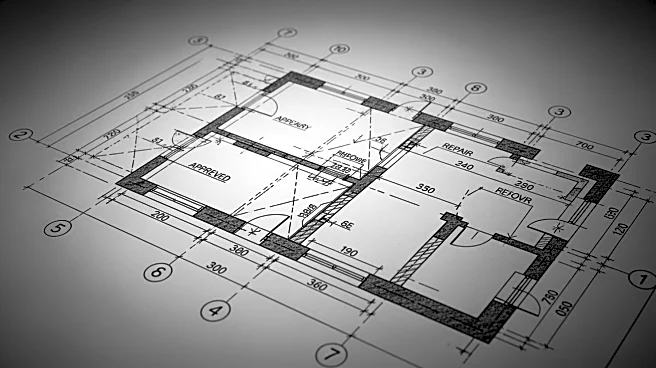What's Happening?
Peterborough City Council has authorized a £900,000 plan to address issues with reinforced autoclaved aerated concrete (Raac) at the city's town hall. The decision was made following the discovery of Raac at the site,
prompting urgent mitigation work to prevent potential collapse. Adrian Chapman, the executive director of place and economy, stated that the Raac will not be removed but will be supported to prevent structural failure. The work is focused on the upper floor of the Bridge Street building, where the current floor construction is insufficient to support falling Raac panels. The council acknowledged that while Raac collapse is unlikely, the consequences could be severe, including risks of fatality or serious injury. Some initial work has already commenced, such as relieving weight on beams where Raac is present. The council's decision to proceed with the repairs was made despite a recommendation from a scrutiny committee to delay until a long-term plan is established.
Why It's Important?
The decision to invest in Raac repairs at Peterborough Town Hall highlights the critical need for infrastructure safety and maintenance. The presence of Raac, a material known for its potential to degrade over time, poses significant risks to public safety. By addressing these issues, the council aims to prevent possible structural failures that could lead to injuries or fatalities. This move underscores the importance of proactive measures in public building management, ensuring that facilities remain safe for occupants and visitors. The situation also reflects broader challenges faced by local governments in maintaining aging infrastructure, which often requires substantial financial investment and strategic planning.
What's Next?
The council plans to continue with the emergency mitigation work while developing a long-term strategy for the building's safety. Future steps may include comprehensive assessments and potential removal of Raac, depending on the findings of ongoing investigations. The council's decision to proceed with repairs despite recommendations for delay indicates a commitment to immediate safety concerns. Stakeholders, including NHS tenants who have vacated the premises due to safety concerns, will be closely monitoring the progress and outcomes of these repairs. The council's actions may set a precedent for other local authorities facing similar infrastructure challenges.
Beyond the Headlines
The situation at Peterborough Town Hall raises broader questions about the use of Raac in public buildings and the long-term implications of relying on materials that may degrade over time. It highlights the need for updated building codes and standards that prioritize safety and durability. Additionally, the financial burden of such repairs can strain local government budgets, necessitating discussions on funding and resource allocation for infrastructure maintenance. The case may prompt other councils to reassess their own buildings for similar risks, potentially leading to widespread evaluations and repairs across the country.











